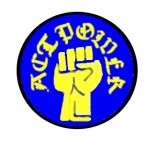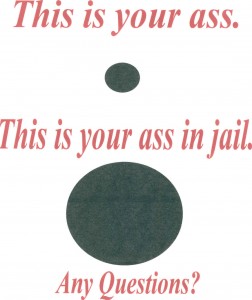 This evening, the Wanganui District Council (Prohibition of Gang Insignia) Bill passed its third reading, by a narrow margin of three votes – three votes cast by the three members of the ACT caucus who represent the authoritarian faction which has edged in on the libertarian faction and now looks likely to consume it. Two of the votes will come as no surprise – the reactionary populist John Boscawen; and card-carrying hang-’em-and-flog-’em brigadoon David Garrett. Most surprisingly Rodney Hide – perhaps in a bizarre sort of solidarity with his two newest MPs, because I thought him better than this – also voted for the bill. The other two members – Sir Roger Douglas and Heather Roy – remained true to their liberal principles and voted against.
This evening, the Wanganui District Council (Prohibition of Gang Insignia) Bill passed its third reading, by a narrow margin of three votes – three votes cast by the three members of the ACT caucus who represent the authoritarian faction which has edged in on the libertarian faction and now looks likely to consume it. Two of the votes will come as no surprise – the reactionary populist John Boscawen; and card-carrying hang-’em-and-flog-’em brigadoon David Garrett. Most surprisingly Rodney Hide – perhaps in a bizarre sort of solidarity with his two newest MPs, because I thought him better than this – also voted for the bill. The other two members – Sir Roger Douglas and Heather Roy – remained true to their liberal principles and voted against.
Let it be understood right away that I agree with the bill’s purpose in principle: to keep the residents of Wanganui free from intimidation by gangs. People have a right not to be intimidated, and that right must be secured by the government. But in this case, the cure is worse than the disease because it does nothing to actually treat the disease, only its smallest symptom; and because it fights arbitrary coercion with more arbitrary coercion.
The bill prohibits persons wearing certain things – `gang insignia’ where `gang’ is essentially at the Wanganui District Council’s discretion, and `insignia’ is determined as an issue of fact by a judge in a given case by recourse to the Evidence Act – from being in certain `specified places’ of the Wanganui district.
This is a weapon long-sought by the authoritarian populists who control Wanganui’s local politics – it enables them to outlaw groups who oppose them, or whom they would otherwise have to deal on more even terms. Practically any group could potentially be declared a gang under the right circumstances – the criteria are that the group, or some of its members be engaged in “a pattern of criminal activity”; that they be commonly identifiable by some sort of symbol which can be recognised well enough to ban; and that the ban be deemed necessary to prevent intimidation. Historically this could have applied to HART protesters, striking longshoremen, tangata whenua occupying land in protest at unjust systems of redress and uncooperative local government bodies. Today it could apply to those campaigning for the h to be put into Wanganui, if the protests become heated enough, which they could well do if Michael Laws carries on the way he has been. One man’s terrorist is another man’s freedom fighter, after all.
But for all that, it won’t matter a damn to the gangs themselves. When you try to constrain identity by legislating against its expressions, you engage in a running battle which cannot be won without continual escalation to more and more illiberal measures. Subcultural systems which are forced to adapt to the norms of a majority culture will always find loopholes – the more constraint imposed, the smarter the subculture gets. The Chinese are finding this out from the Song of the Grass-Mud Horse (video with full-colour English translation here), and the parents of tweens are finding it out from Britney Spears, and media content owners are finding it out from filesharers. If a broad ban on patches is enforced then the definition of what constitutes a gang symbol will change. Bandanas, coloured clothing, and so on will be worn instead of patches, but will convey the same intimidatory meaning. What then? Either the law is an ass, having failed to prevent what it seeks to prevent, or the definition of what constitutes insignia in law must change to match the definition in usage. I own the typical blue-and-black checked swanndri – should I be barred from wearing it in public in Wanganui, lest someone feel intimidated? Should my sister, who owns a red one? Talk of banning all blue and all red will be decried as reductio ad absurdum, but ultimately that’s the only way the policy will work, for the two main gangs which operate in Wanganui anyhow.
Or perhaps they’ll just ban those colours when they’re worn by MÄori men of a certain build, and there’s the rub. Fundamentally, culture and class and inequality are the issues over which gang insignia are mere wallpaper, and banning it no more addresses the problem than changing the wallpaper stops the walls of a leaky building from leaking. Fix the alienation problem and you fix gangs – something that driving those at the margins of civil society further out into the cold will never achieve.
Update: Former Detective Sergeant in charge of the Auckland gang unit Cam Stokes made the same argument on Nine to Noon this morning. He goes further, arguing that the ban could make the work of Wanganui police more difficult by robbing the police of some intelligence-gathering capability, and could make convictions for some offences difficult to secure.
Another update: At The Standard Eddie reveals that Hide’s support for the bill – despite categorically stating ACT would never support it – was a trade-off for National supporting the 3 strikes bill. Filthy political lucre!
L





